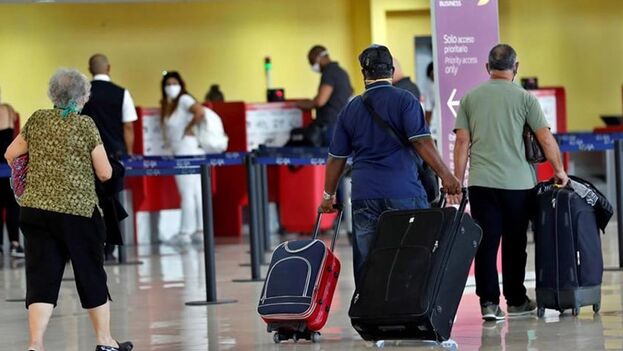
![]() 14ymedio, Yoani Sánchez, Havana, 3 October 2021 — In a drawer I keep a box with photos that I avoid looking at. They are images filled with the faces that have left, hundreds of friends, colleagues and relatives who no longer inhabit this Island. The escape of athletes, artists, rafters or officials accelerates as the country sinks. Right now, we live in times of a resounding crash and constant goodbyes.
14ymedio, Yoani Sánchez, Havana, 3 October 2021 — In a drawer I keep a box with photos that I avoid looking at. They are images filled with the faces that have left, hundreds of friends, colleagues and relatives who no longer inhabit this Island. The escape of athletes, artists, rafters or officials accelerates as the country sinks. Right now, we live in times of a resounding crash and constant goodbyes.
The flight of 11 Cuban baseball players during the U23 World Baseball Championship in the Mexican state of Sonora, has been the most recent chapter of this bleeding, but every day many others make the decision to leave, they get on a plane without looking back, go through the jungle or cross the sea. They are expressing with their feet what they dare not say out loud: the system is a failure and the country is unlivable.
The final destination can be anywhere. Yesterday a friend announced that she is going to Iceland, another island that she only knows is “far from Cuba and they are not building socialism.” The neighbor on the corner tore up his Communist Party card and now works for a cleaning crew in Miami; meanwhile a childhood friend is organizing a marriage of convenience to emigrate to Italy.
Some regret having waited so long. “My sister warned me and I thought this was going to improve, but it goes backwards like the crab,” the clerk at a nearby agricultural market tells me. “I’d rather start from scratch anywhere than spend the rest of my life here,” she says. Two customers who down a glass of juice nod their heads after listening to her.
All those who come to the conclusion that “you have to go out and get out now” have that look of absolute resolution that is seen in the turning points of life. I have noticed this harshness in widows, in families who have lost everything after a fire and even in prisoners sentenced to long sentences. It is as if after having been stripped of everything, they understand that they have one last power left: the power over their bodies.
And this faculty of deciding to distance yourself — physically or mentally — from what hurts and angers, is what the thousands of Cubans who emigrate every year are exercising. Neither the triumphant headlines in the official press, nor the slogan-lit school assemblies each morning, nor the promises of a “prosperous and sustainable” model just around the corner deter them. They are fed up.
At the beginning, Cuba officialdom justified their escapes by labeling those who went into exile as bourgeoisie after their properties, industries and businesses had been confiscated. Later, they were called “escorias” – slag, dregs, scum – because they were the disposable by-products of the “foundry of the New Man.” Even today, they are described as weak people before “the siren songs of capitalism.”
Skillfully, Castroism has also used emigration as a valve to release social pressure. It is no coincidence that the great Cuban migratory waves, such as the departure from the Port of Mariel in 1980 or the Rafter Crisis in the summer of 1994 have been preceded by serious economic hardships and an increase in citizen discontent. The popular protests of July 11 have also been played their part in the stampede and we are already living it.
The shame that practically half of a sports delegation escapes from a competition is something that is not cleaned up with the hefty dollars in remittances sent later by the emigrants. The phenomenon only occurs in countries-prisons in the style of the communist bloc of Eastern Europe, the dynastic dictatorship of the Kims in North Korea, in Belarus … and on this Island. We are on the list of nations that feel like bars; of systems that are experienced like cages.
We expect months of saying goodbye every day, because they will not be able to put a policeman next to every Cuban who travels in an official delegation. The leaks may also touch the highest levels of power, because rats leave the ship when it sinks, not because they are “rats,” but because they are smart. They feel that it is only a matter of time before this empty shell of the system is buried by the waters of change.
____________
COLLABORATE WITH OUR WORK: The 14ymedio team is committed to practicing serious journalism that reflects Cuba’s reality in all its depth. Thank you for joining us on this long journey. We invite you to continue supporting us by becoming a member of 14ymedio now. Together we can continue transforming journalism in Cuba.
